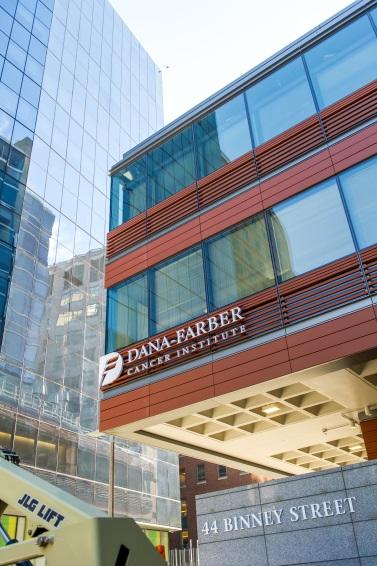Dana-Farber researchers report clinical trial results in treatment of leukemia and lymphoma
New results from clinical trials of immunotherapy and experimental targeted agents for patients with leukemia and lymphoma are being presented by Dana-Farber Cancer Institute researchers at the American Society of Hematology (ASH) Annual Meeting Dec. 1-4.
Here are summaries of three presentations, including one that compared outcomes of CAR T-cell therapy in patients in clinical trials with outcomes in the “real world” of clinical practice:
CAR T-cell treatment provides durable benefit to lymphoma patients outside clinical trials
Outcomes in non-Hodgkin lymphoma patients treated with the CAR T-cell product Yescarta in the “real world” are similar to results seen in the more limited clinical trial setting, say researchers from Dana-Farber.
The scientists, led by Caron Jacobson, MD, Medical Director of the Immune Effector Cell Therapy Program at Dana-Farber, performed a multicenter retrospective study of Yescarta used to treat relapsed or refractory large B-cell lymphoma and compared the results with those in the ZUMA-1 trial, the first multicenter phase II trial evaluating CAR T-cells in this disease.
In the ZUMA-1 trial, treatment with the CAR T-cell product, axicabtagene ciloleucel (Yescarta) achieved durable responses in 40 percent of relapsed or refractory lymphoma patients. The 76 patients in the “real world” setting studied by Jacobson and colleagues were sicker and had poorer performance status than those treated in the clinical trial. “Over 60 percent of our patients would not have been eligible for ZUMA-1, and so the similarity of results between the broader real world and more limited clinical trial settings are quite encouraging,” Jacobson said.
The overall response rate and the rate of complete responses “is a bit lower than what was seen in ZUMA-1,” Jacobson said, “but the durability of responses is nearly identical, so Yescarta seems to provide durable benefit in the same proportion of patients in the ‘real world’ as it did in the clinical trials.”
The study being reported at ASH also showed that patients who had biomarkers indicating a low level of inflammation on the day of treatment had better outcomes. “These results suggest that strategies to decrease levels of peak inflammation may improve the safety of this therapy while improving clinical outcomes,” said Jacobson.
The results will be discussed in an oral presentation at Session 627 on Saturday, Dec. 1 at 9:45 a.m. PST in Pacific Ballroom 20 of the Marriot Marquis San Diego Marina.
Checkpoint inhibitor achieves lengthy responses in aggressive type of B-cell lymphoma
Immunotherapy with the drug pembrolizumab has “robust antitumor activity” and can achieve long-lasting responses in patients with an aggressive form of non-Hodgkin lymphoma, report scientists from Dana-Farber.
Philippe Armand, MD, PhD, Director of the Clinical Research Lymphoma Program at Dana-Farber, is first author of a report on phase 1b and phase 2 trials of pembrolizumab (Keytruda) in patients with relapsed or refractory primary mediastinal large B-cell lymphoma (PMBCL). This aggressive disease develops from cells in the thymus gland and makes up about 4 percent of non-Hodgkin lymphomas. Unlike diffuse large B-cell lymphoma (DLBCL), PMBCL often attempts to evade the immune system by deploying cell surface proteins known as PD-L1 and PD-L2, which bind to PD-1 checkpoint receptors on immune T cells. Pembrolizumab blocks the PD-1 checkpoint and frees the immune system to attack tumors.
Armand reported on trials KN013, which enrolled patients who had failed or were ineligible or refused autologous stem cell transplant, and KN170, which included patients who had relapsed after or were ineligible for transplant with two or more lines of prior therapy. In KN013, the objective response rate was 48 percent and the rate of complete responses was 33 percent. In KN170, after a median follow-up of 12.5 months, objective response rate was 45 percent and complete response rate was 13 percent. “No patient who achieved a complete response in KN170 had relapsed by the data cutoff point,” said Armand.
These results provided the basis for the Food and Drug Administration accelerated approval of pembrolizumab in patients with relapsed or refractory PMBL, Armand said.
Armand will present the study in Session 626 on Saturday, Dec. 1 at 5:15 p.m. in Pacific Ballroom 20 of the Marriott Marquis San Diego Marina.
Targeted agent plus chemotherapy is well-tolerated, achieves promising survival in AML
An experimental drug added to standard chemotherapy for patients with acute myeloid leukemia (AML) resulted in promising remission and survival rates and was well-tolerated, with no increase in adverse events, reports a Dana-Farber physician-scientist.
Daniel DeAngelo, MD, PhD, Chief of the Division of Leukemia at Dana-Farber, is the lead investigator of a phase 1/2 trial of uproleselan added to standard anti-leukemia therapy in patients with relapsed of refractory AML and newly diagnosed patients age 60 and above. Uproleselan is a targeted agent that blocks E-selectin binding on leukemia blast cells. Binding of E-selectin to cancer cells enables leukemia cells to resist chemotherapy. Patients in this trial achieved high and promising remission and overall survival rates and had low induction-related mortality rates.
“Two of the most striking findings from this study are the number of patients negative for measurable residual disease and the low rate of mucositis” – a common and painful inflammation of the digestive tract caused by chemotherapy, said DeAngelo.
Phase 3 studies of uproleselan and chemotherapy are underway.
DeAngelo will present the results at Session 616 on Sunday, Dec. 2 at 9:30 a.m. in Grand Hall B of the Manchester Grand Hyatt San Diego.
Complete details on Dana-Farber’s activities at ASH are available online at our American Society of Hematology (ASH) Annual Meeting page.
Media Contacts
If you are a journalist and have a question about this story, please call 617-632-4090 and ask to speak to a member of the media team, or email media@dfci.harvard.edu.
The Media Team cannot respond to patient inquiries. For more information, please see Contact Us.
